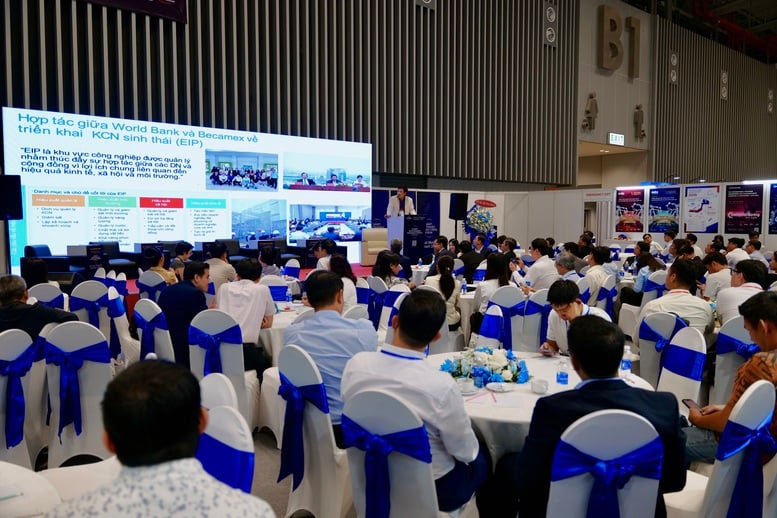
The Sustainable Smart Manufacturing Forum was organized by the Vietnam Industrial Parks Information Portal (VIZ). Photo: VGP
This information was emphasized by experts and business leaders at the recent Sustainable Smart Manufacturing Forum organized by the Vietnam Industrial Park Information Portal (VIZ), when assessing the challenges and opportunities that older technology factories are facing in the global green transformation trend.
Technical barriers are being transformed into tariff barriers.
"This is the first time technical barriers have been transformed into tariff barriers, directly affecting the competitiveness of Vietnamese businesses. Not only export businesses, but also countries like Vietnam will be affected if they do not adapt in time," warned Mr. Dang Hai Dung, Deputy Director of the Department of Green Transformation, Industrial Promotion and Sustainable Production ( Ministry of Industry and Trade ).
According to Mr. Dung, the current challenges faced by factories using outdated technology stem not only from the inherent limitations of their production lines but also from the immense pressure of the global market. New regulations and standards on sustainable development – especially in key export markets such as the EU and the United States – are becoming increasingly stringent.
Besides the CBAM mechanism, other mechanisms such as the Sustainable Finance Directive (Green Deal) or the EU's Green Taxonomy regulations will also restrict investment flows from Europe to countries with production systems that do not meet green standards or lack transparency regarding emissions.
"Therefore, complying with green standards is no longer an option, but a mandatory condition if we want to maintain exports and attract investment," Mr. Dung affirmed.
Those The factory faces a major challenge due to its outdated technology.
In a detailed assessment, representatives from the Green Transformation Department pointed out three major challenges that businesses using outdated technologies are facing:
Firstly, there are technological and emission measurement challenges. Meeting carbon footprint standards requires businesses to have a transparent, accurate emission management system, certified by independent certification bodies. This necessitates investment in measurement equipment, digital technology applications, and data management software. However, most older factories currently lack the necessary technological infrastructure for this.
Second, there is the challenge of human resources. Operating a green production line requires a team of engineers and technicians who are well-trained in cleaner production, energy management and emission control. However, the workforce that meets these requirements is still very limited, especially in localities outside the center or in old-generation industrial zones.
Thirdly, there are challenges related to information and compliance costs. Many businesses currently lack sufficient information about international standards, have limited access to reputable certification bodies, and face difficulties in declaring emission data as required by foreign partners. The cost of independent measurement, monitoring, and certification services remains a significant burden for small and medium-sized enterprises.
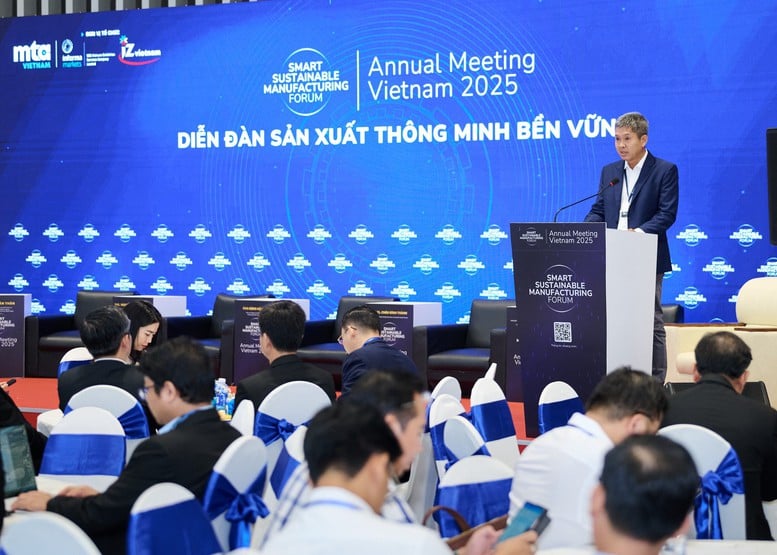
Mr. Vo Van Than, Chairman of the Ho Chi Minh City Industrial Parks Association (HBA), speaks at the Sustainable Smart Manufacturing Forum. Photo: VGP
From a practical perspective, Mr. Vo Van Than, Chairman of the Ho Chi Minh City Industrial Parks Association (HBA), frankly shared: "Currently, following the general trend, businesses are forced to transform in order to survive and develop. However, reality shows that many businesses are still very slow in implementing these changes."
According to Mr. Than, the main reason is that business owners' awareness of the importance of transformation is still limited. "Many businesses don't know where to start, due to a lack of a clear roadmap and specific guidance. Ultimately, the lack of financial and technical resources is the biggest obstacle preventing them from transforming, even if they want to," Mr. Than analyzed.
"In particular, in manufacturing or startups in general, financial resources are always a prerequisite. Without specific capital support mechanisms, businesses will find it very difficult to invest in technological innovation and equipment to meet the transformation trends," the Chairman of HBA emphasized.
Based on his practical experience, Mr. Vo Son Dien - Chairman of the Binh Duong Supporting Industries Association, Project Director of the Riverside Binh Duong Science and Technology Industrial Park - under Becamex IDC, and an expert with nearly 30 years of experience in industrial park development - also pointed out three bottlenecks hindering the industrial transformation process in the southern provinces, especially in the Southeast region:
"Firstly, land and infrastructure costs are increasingly high, making it difficult for small and medium-sized enterprises (SMEs) to access them. Meanwhile, labor-intensive or low-value-added industries will gradually have to relocate to lower-cost areas such as Central Vietnam or the Red River Delta," Mr. Dien pointed out.
"Secondly, there is a lack of appropriate financial mechanisms; we do not yet have mechanisms for allocating land capital or long-term infrastructure development funds. Disbursement is slow, procedures are complicated, especially those related to legal procedures."
"Thirdly, policies are inconsistent and have not kept pace with reality. The boundary between 'eco-industrial parks' and 'high-tech parks' is still vague, causing confusion in licensing and operation."
Mr. Dien suggested that a more transparent and flexible "post-inspection" mechanism is needed instead of focusing on "pre-inspection" through licenses.
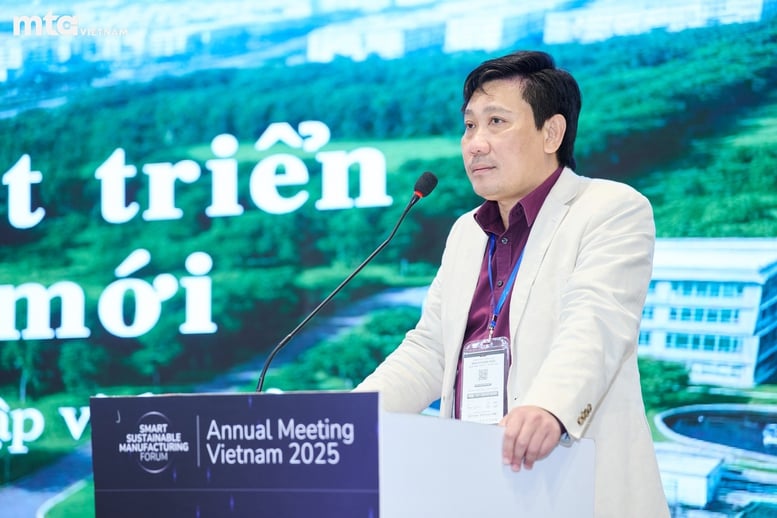
Mr. Vo Son Dien, Chairman of the Binh Duong Supporting Industries Association, speaks at the Forum. Photo: VGP
The role of state support and cooperation mechanisms.
Sharing his thoughts on the role of support mechanisms, Mr. Vo Van Than said: "Previously, Ho Chi Minh City had several very effective mechanisms to support businesses in accessing investment capital for production transformation. Specifically, there was the investment stimulus program from the city budget, supporting businesses with preferential interest rates to invest in technological innovation, equipment, and transforming conventional production models into smart, sustainable production."
A prime example is the Vinh Loc Industrial Park, which participated in this program to borrow capital for upgrading its wastewater treatment system – a crucial step in the green transformation process.
"I hope that after the recent administrative boundary mergers, this stimulus policy of Ho Chi Minh City will continue to be maintained and expanded, especially for small and medium-sized enterprises - those that face the most difficulties during the transition," Mr. Than expressed.
To address the aforementioned challenges, a representative from the Green Transformation Department shared that the Department is currently collaborating with ministries, localities, and the business community to develop specific support mechanisms, comprising four main areas:
Establish a technology transformation support center: To provide information, technical services, human resource training, and support businesses in identifying roadmaps and selecting technologies suitable for new requirements.
Implementing energy audit programs, product lifecycle assessments, and carbon footprint analysis: Through international collaborative projects and green finance mechanisms, support businesses in accessing measurement tools and upgrading their operational capabilities.
Review and improve the policy system: This includes regulations on eco-industrial parks, high-tech zones, green factory construction standards, and credit and tax incentives for businesses implementing sustainable transformation.
"We also recommend close coordination between the Ministry of Industry and Trade, the Ministry of Finance, and local authorities to form comprehensive support packages, helping businesses overcome initial cost barriers, especially in key industrial sectors operating inside and outside industrial parks," Mr. Dung proposed.
A comprehensive networking platform for business associations is needed.
According to Mr. Vo Son Dien, Chairman of the Binh Duong Supporting Industries Business Association (BASI), sustainable industrial development, especially in the context of digital transformation and green transformation, is essential, along with a strong connection between investors, businesses, investment funds, and policy-making agencies.
"Currently, the number of technology companies in industrial parks is very limited - less than 100 companies in the southern region. The majority are small and medium-sized enterprises with weak capacity to access technology, lacking platforms for experimentation, networking, or access to policy support," shared the representative of the BASI Chairman.
Therefore, BASI expects to become a platform – a "common home" – to help build smart manufacturing alliances, promote supply chain transformation, support workforce training, and develop green industrial models.
BASI also suggested that major investors such as Becamex, VSIP, Long Hau... and international partners should collaborate to form a network for innovation, technology sharing, and market access for Vietnamese businesses, especially in the context of increased scrutiny of product origin, trade defense measures, and demands for supply chain transparency from major markets.
As Chairman of the Ho Chi Minh City Industrial Zones Association, Mr. Vo Van Than believes that there is a great need for more mechanisms to support investment capital for technological innovation, consulting and training of high-skilled technical personnel, connecting businesses with universities and research institutes, and developing centers to support the transformation of manufacturing businesses.
Concurring with this viewpoint, Ms. Nguyen Thi Kim Khanh, CEO of the Sustainable Smart Manufacturing Forum and General Director of VIZ, shared: "We organized this Forum because we recognized the need for collaboration among HBA, BASI, and other associations in the manufacturing and financial sectors to create a comprehensive connection and build an ecosystem to support factories in their sustainable transformation."
Affirming his commitment to partnership, Mr. Dang Hai Dung emphasized: "Transitioning to a smart and sustainable production model is an essential requirement. However, this cannot be a solitary journey for businesses. It must be a joint effort of the entire ecosystem – including the State, schools, businesses, and organizations providing technical and financial support."
"The Ministry of Industry and Trade is committed to working alongside businesses, listening to and synthesizing their opinions, and proposing appropriate policies. We believe that with unity, sharing, and the right policy mechanisms, Vietnam can successfully transform itself into a green and smart industrial manufacturing hub in the region," Mr. Dung affirmed.
Because the transformation to sustainable smart manufacturing is not only a challenge but also a great opportunity for old technology factories in Vietnam to improve their competitiveness, participate more deeply in the global value chain and contribute to building a green and sustainable economy.
Source: https://baochinhphu.vn/nha-may-cong-nghe-cu-va-bai-toan-chuyen-doi-xanh-102250711212840412.htm








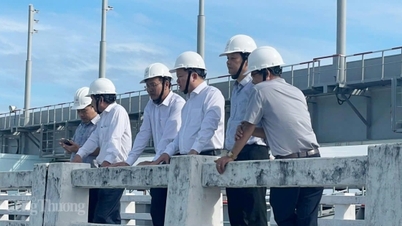

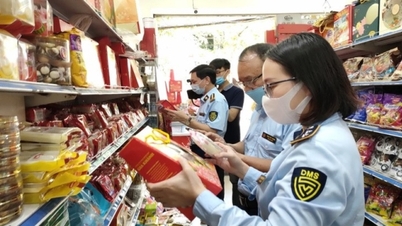

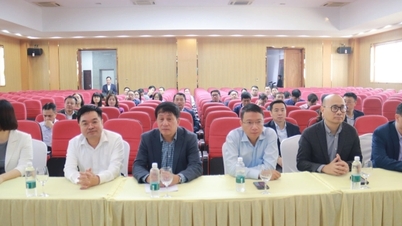

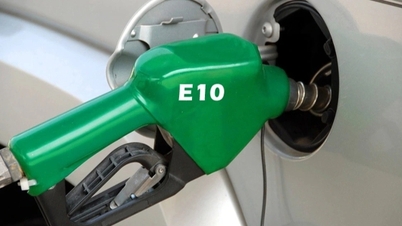
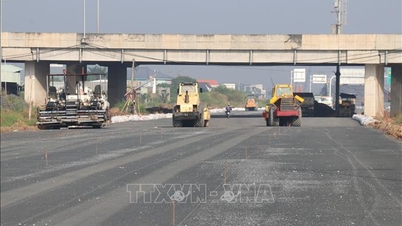

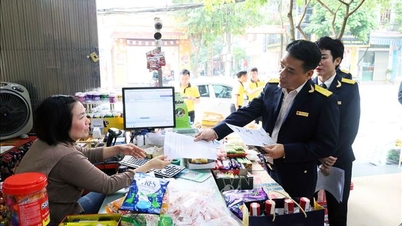
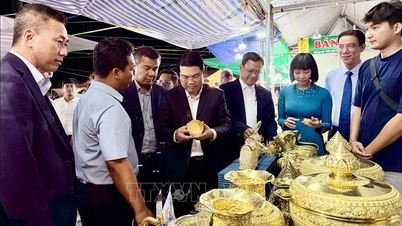
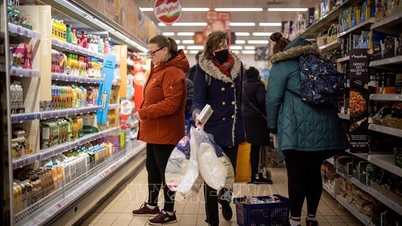
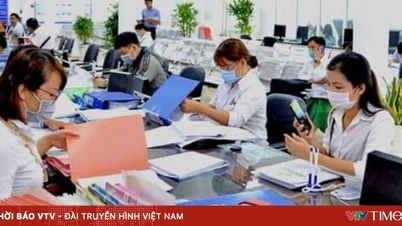

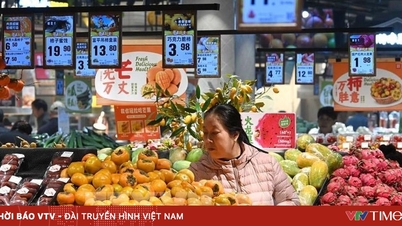




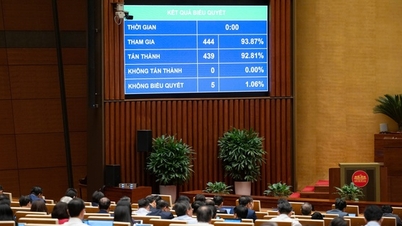
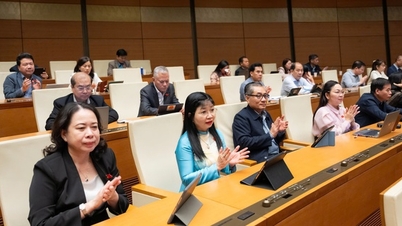
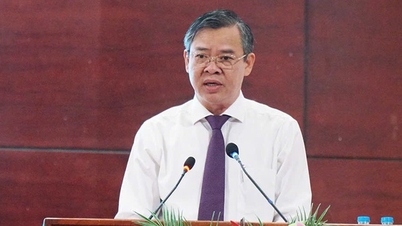
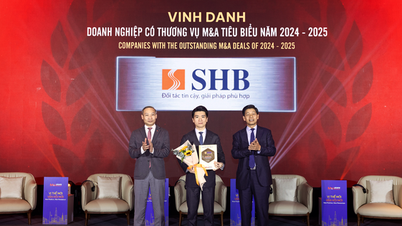
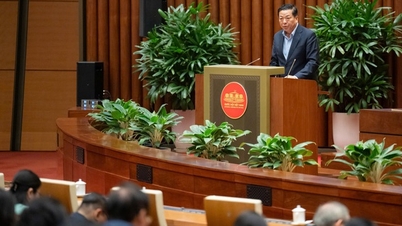






![[Video] The craft of making Dong Ho folk paintings has been inscribed by UNESCO on the List of Crafts in Need of Urgent Safeguarding.](https://vphoto.vietnam.vn/thumb/402x226/vietnam/resource/IMAGE/2025/12/10/1765350246533_tranh-dong-ho-734-jpg.webp)








































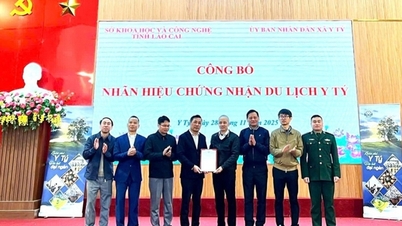
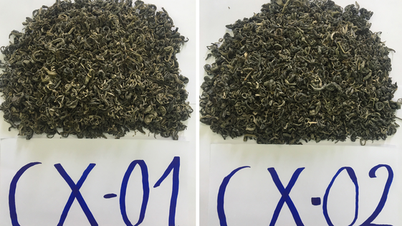
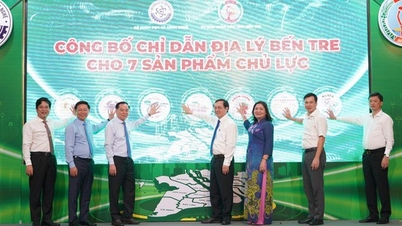
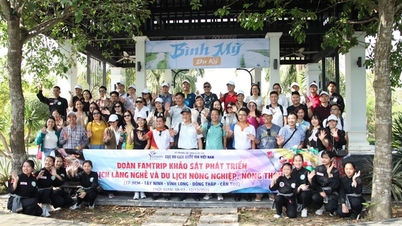

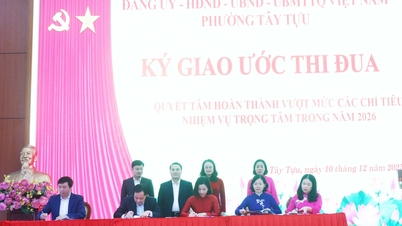
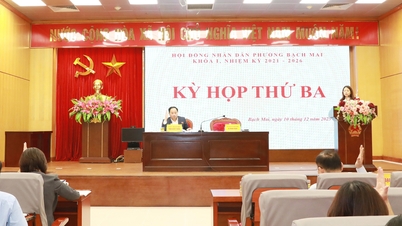
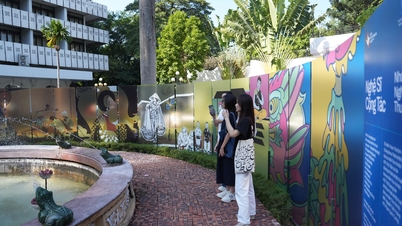




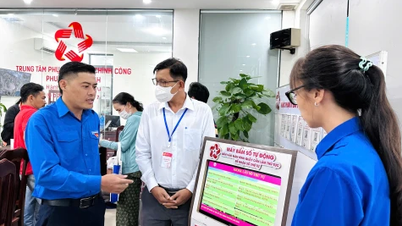


















Comment (0)